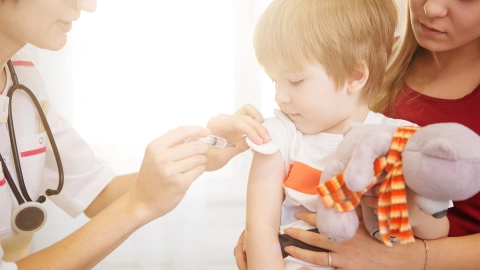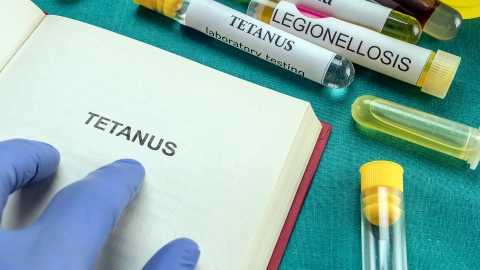Healthy living Vaccinations: protection against infectious diseases
Vaccinations can help prevent infectious diseases and often restrict their spread. Many standard vaccinations are recommended even for young children, to whom they provide lifelong protection against dangerous infections such as mumps and rubella.
At a glance
- Vaccinations help the body combat pathogens quicker and more effectively.
- They also help to stop pathogens from spreading.
- Since the introduction of vaccinations, many dangerous infectious diseases have become rare.
- Mild, temporary reactions to a vaccination, e.g. swellings and redness at the injection site, are normal and non-dangerous.
- Serious side effects following vaccinations are generally very rare. They can differ depending on the vaccine.
- The Standing Committee on Vaccination in Germany (Ständige Impfkommission – STIKO) provides recommendations on who should have which vaccinations and when.
Note: The information in this article cannot and should not replace a medical consultation and must not be used for self-diagnosis or treatment.

What is a vaccination?
Vaccinations protect against contagious diseases (infectious diseases) and are therefore sometimes referred to as protective vaccinations. Vaccinations enable many infectious diseases to be prevented and their spread to be restricted or even halted.
Vaccinations protect against infectious diseases
Infectious diseases are often caused by bacteria or viruses. However, there are also infectious diseases caused by fungi or single-celled organisms. The spectrum ranges from mild common colds to serious illnesses such as meningitis, lockjaw (tetanus) or polio (poliomyelitis). The pathogens are transmitted, for example, through direct contact with other people, when handling animals, via the air, or through the shared use of objects such as door handles.
Many infectious diseases can be prevented through good hygiene measures. A healthy immune system also protects against many pathogens. However, even when the immune system is healthy, some pathogens can cause serious illnesses, such as tetanus. Vaccinations are particularly important for such illnesses, which are associated with a high risk of a serious or fatal outlook.
Vaccinations restrict the spread of infectious diseases
Vaccinations also often do more than just protect the people who get vaccinated. They can also help to restrict or even halt the spread of the relevant infectious disease, i.e. the transmission of the infection from person to person.
In countries with high vaccination rates, such as Germany, the prevalence of serious infectious diseases such as polio (poliomyelitis), diphtheria and lockjaw (tetanus) has been majorly reduced. According to the World Health Organization (WHO), smallpox were eradicated in 1979 due to a global vaccination campaign. The current aim is to globally eradicate polio. Germany is also trying to use vaccinations to completely eradicate measles.
How do vaccinations work?
If people contract pathogens such as bacteria or viruses, the body will try to fight them. The immune system is activated and, among other things, forms antibodies that attach to the pathogens. This enables the body’s defensive cells to identify, eliminate and, in many cases, successfully fight the pathogens.
Video What are antibodies?
The following video explains what antibodies are and what they do.
This and other videos can also be found on YouTube
Watch nowThe privacy policy indicated there applies.
Upon repeat contact with the pathogen, the immune system can react far more quickly because the body “remembers” it to a certain extent: it produces the right antibodies more rapidly, enabling it to fight the pathogen faster and more effectively. This explains why people only usually get some infectious diseases such as mumps, rubella and chickenpox once in life. They are then immune from, i.e. insensitive to, the disease.
A vaccination works similarly to an initial infection: the immune system learns to identify the pathogen. This enables it to react in a rapid, targeted manner upon renewed contact and to fight the pathogen. Unlike an infection, however, the vaccine does not trigger an illness. Instead, it prevents the illness from developing or at least from having a serious outlook.
Vaccine types
There are various types of vaccines. These have different constituent elements but very similar effects.
- Live vaccines: vaccines containing live, seriously attenuated pathogens. Examples: vaccines for measles, mumps and rubella.
- Inactivated vaccines: vaccines that contain dead pathogens or pathogen elements. Examples: vaccines for diphtheria, hepatitis B and tetanus.
- Genetic vaccines: vaccines containing the genetic information for the blueprint of pathogen components. These include mRNA and vector vaccines. Examples: most vaccines for COVID-19.
Primary immunization
Primary immunization refers to the vaccinations required to establish an effective level of protection. This usually involves two or three vaccine doses. A single vaccine dose is rarely sufficient. With some vaccinations, people are protected for life following primary immunization. In the case of others, boosters are required at certain intervals.
Video How do vaccinations work?
The video below explains how a vaccination works.
This and other videos can also be found on YouTube
Watch nowThe privacy policy indicated there applies.
Exception: passive immunization
In addition to active immunization through the use of vaccinations, there is also passive immunization. With this, instead of the body being stimulated to produce antibodies against certain pathogens, the right antibodies are administered to it directly. These antibodies can either be biotechnologically produced or come from people who are already immune to the disease and who have donated antibodies within the scope of a plasma or blood donation.
Passive immunization can quickly protect against pathogens and prevent a disease from developing. It is used, for example, if people are suspected of having contracted a harmful pathogen, such as the rabies virus (rabies) or the tetanus bacterium (tetanus), and are not sufficiently immunized against the disease. Even with COVID-19, antibodies are sometimes used to prevent the disease or a serious outlook.
Important: unlike vaccinations, the administration of antibodies works extremely quickly but the protective effect is not as long-lasting.
Which vaccinations are recommended?
There are many infectious diseases that can now be avoided through vaccinations.
In Germany there is an independent expert body, the Ständige Impfkommission (STIKO – Standing Committee on Vaccination), which is continuously evaluating current scientific understanding of vaccinations and which then makes vaccine recommendations for Germany.
It should be noted that some vaccinations are only recommended for specific age groups or groups of people who can particularly benefit from the vaccinations, for example because they suffer from a chronic illness that increases the risk of a severe outlook.
The STIKO currently recommends standard vaccinations against the following illnesses:
- diphtheria
- lockjaw (tetanus)
- whooping cough (pertussis)
- polio (poliomyelitis)
- hepatitis B
- measles
- mumps
- rubella
- chickenpox
- shingles (herpes zoster)
- flu (Influenza)
- haemophilus influenzae type B infections
- human papillomavirus (HPV) infections
- pneumococcal infections
- meningococcal infections
- rotavirus infections
Most standard vaccinations should be administered during childhood. Some need to be boosted two or three times during adolescence to provide lifelong protection. These include vaccinations against tetanus, diphtheria, whooping cough and polio.
Important: vaccinations against tetanus and diphtheria also have to be boosted every 10 years throughout adulthood to offer effective protection.
Further information about vaccination and a vaccination calendar can be obtained from the website impfen-info.de, a service provided by the Federal Center for Health Education (Bundeszentrale für gesundheitliche Aufklärung – BZgA).
Measles immunization and mandatory vaccination
Measles is a highly contagious disease that is primarily transmitted by droplets suspended in the air. Complications and secondary diseases are common. Vaccination protects against measles and prevents the disease from spreading.
Almost all vaccinations are solely subject to recommendations, i.e. people can independently decide whether they want to vaccinate and protect themselves or their child.
The measles vaccination is an exception: the Measles Protection Act (Masernschutzgesetz) has been in force since March 2020 and stipulates that anyone born after 1970 who is cared for or works in a community facility or who works in a medical facility must be demonstrably vaccinated against measles.
Alternatively, such people can provide a medical certificate that shows sufficient immunity against measles. This can be obtained by people who have already had measles as a measles infection provides lifelong immunity.
The Measles Protection Act aims to protect people against measles who could not (yet) be vaccinated, for example in the case of infants or people with an immunodeficiency. In the long-term, measles should be completely eradicated through a high vaccination rate – as is already the case with smallpox.
Further information about measles and the Measles Protection Act can be found at masernschutz.de, a service provided by the Federal Center for Health Education (Bundeszentrale für gesundheitliche Aufklärung – BZgA).
What other vaccinations are there?
In addition to the standard vaccinations, there are also other vaccinations (indicated vaccinations) that are recommended under certain circumstances:
- a heightened, work-related risk: for example the vaccination against hepatitis A for healthcare professionals
- a heightened personal risk: for example vaccinations against pneumococcal and meningococcal bacteria for people with certain pre-existing conditions such as an immunodeficiency
- travel in high-risk areas: for example vaccinations against cholera, yellow fever and rabies
- residence in high-risk areas: in Germany, this is particularly relevant with regard to the vaccination against tick-borne encephalitis (TBE)
- specific risk situations such as epidemics and pandemics: for example the vaccination against COVID‑19
Information about travel vaccinations can be obtained from doctors and specialists in travel medicine. The Standing Committee on Vaccination (STIKO) and the Foreign Office also provide information about vaccination options when traveling abroad.
Information about TBE vaccination and the current high-risk areas can be obtained from impfen-info.de, a service provided by the Federal Center for Health Education (Bundeszentrale für gesundheitliche Aufklärung – BZgA).
What should be considered when pregnant or trying to conceive?
Some infectious diseases can be more serious for pregnant women or can harm the unborn child. To protect themselves and their child, women should therefore ideally have all recommended vaccinations prior to pregnancy. This particularly applies in the case of vaccinations involving a live vaccine, such as those for chickenpox, measles and rubella. This is because these vaccines are not allowed to be administered during pregnancy.
On the other hand, vaccinations against flu (influenza) and whooping cough (pertussis) are particularly recommended during pregnancy. These are inactivated vaccines that do not pose any risks to the child. Vaccination from the second trimester can provide an unborn child with “nest protection”, protecting it against flu and whooping cough for the first few months of life until it can be vaccinated itself.
How safe are vaccines?
Vaccinations are classed as extremely safe. There are several reasons for this: All vaccines placed on the market in Germany must first undergo an extensive authorization procedure. This involves the responsible authorities checking the data on the vaccine’s quality, efficacy and safety. The Paul Ehrlich Institute (PEI) is responsible for this role in Germany and the European Medicines Agency (EMA) at European level.
Following the authorization, the Paul Ehrlich Institute verifies the quality of every batch of vaccines produced prior to their placement on the market, and clears every single batch for marketing in Germany. A legally regulated reporting system also ensures that suspected side effects can be collated and evaluated by the PEI. This makes it possible to detect potential, previously unknown risks and side effects at an early stage.
How well-tolerated are efficacy enhancers in vaccines?
Some inactivated vaccines contain, for example, aluminum compounds as efficacy enhancers (adjuvants) in order to sufficiently activate the immune system and develop effective protection.
Adjuvants are used in vaccines against tetanus, diphtheria, and whooping cough, for instance. They are needed because those vaccines only contain killed pathogens or parts of them, which on their own do not sufficiently stimulate the immune system.
The aluminum compound content in vaccines approved in Germany and Europe is less than the maximum specified by the European Pharmacopoeia. The additional aluminum compounds taken in via vaccines is minimal in relation to the daily absorption via the air, drinking water and food.
The tolerability of the vaccines, including the efficacy enhancers, is also assessed very precisely during the authorization procedure. The safety of the vaccine is also continually monitored following the authorization.
What is a vaccination reaction?
A mild physical reaction to a vaccine is known as a vaccination reaction. This is a natural, non-hazardous reaction that normally disappears within a day or so. Typical post-vaccination issues include reddening, swelling and pain at the injection site.
Examples of general reactions after vaccinations include a high temperature, headache and limb pain, nausea, and diarrhea. When live vaccines are used, for example against measles, mumps or rubella, mild symptoms that resemble the relevant illness may occasionally appear after the vaccination. However, they are not comparable with the real illness and the person concerned is not infectious.
Can serious side effects occur?
In recent decades, vaccinations have become more and more tolerable, so that serious side effects only occur very rarely. Examples of these include severe allergic reactions, febrile seizures in the case of children’s vaccines or bowel obstructions after rotavirus vaccinations.
Information on how to report suspected side effects can be found on the Paul Ehrlich Institute (PEI) website.
What considerations are required in the event of an albumen allergy?
Some vaccines contain low traces of albumen as they are produced in hen’s eggs. People should always advise doctors if they have an albumen allergy so they can take suitable precautions. Despite this, most people with an albumen allergy can still be safely vaccinated with such vaccines.
Where can I find further information about vaccinations?
Anyone with questions about immunization in general or about specific vaccinations can speak directly to a doctor. There are also reliable online sources with a wide range of information. These include:
Bundesgesundheitsministerium: Impfungen (Federal Ministry of Health: Immunizations)
Paul-Ehrlich-Institut: Impfstoffe (Vaccines)
Robert Koch-Institut: Impfungen A – Z (Vaccines A – Z)
When traveling abroad:
Auswärtiges Amt: Reisemedizin (Foreign Office: Travel Medicine)
- Bundeszentrale für gesundheitliche Aufklärung (BZgA). Gemeinschaftsschutz: Schutz für den Einzelnen und die Gemeinschaft. impfen-info.de. Aufgerufen am 29.11.2022.
- Bundeszentrale für gesundheitliche Aufklärung (BZgA). Impfempfehlungen für Schwangere. impfen-info.de. Aufgerufen am 29.11.2022.
- Bundeszentrale für gesundheitliche Aufklärung (BZgA). Impfkalender 2022 – Welche Impfungen sind empfohlen? impfen-info.de. Aufgerufen am 29.11.2022.
- Bundeszentrale für gesundheitliche Aufklärung (BZgA). Impfschutz für die ganze Familie: 20 Fragen – 20 Antworten. impfen-info.de. Aufgerufen am 29.11.2022.
- Bundeszentrale für gesundheitliche Aufklärung (BZgA). Welche unterschiedlichen Impfstoffe gibt es? impfen-info.de. Aufgerufen am 29.11.2022.
- Paul-Ehrlich-Institut (PEI). Enthalten Impfstoffe Aluminium? Aufgerufen am 04.12.2022.
- Robert Koch-Institut (RKI). Antworten auf häufig gestellte Fragen zur Schutzimpfung gegen Masern. Aufgerufen am 31.10.2022.
- Robert Koch-Institut (RKI). Elimination impfpräventabler Erkrankungen. Aufgerufen am 29.11.2022.
- Robert Koch-Institut (RKI). Empfehlungen der Ständigen Impfkommission beim Robert Koch-Institut 2022. Epidemiologisches Bulletin. 04/2022.
- Robert Koch-Institut (RKI). Impfungen bei Vorerkrankungen. Aufgerufen am 07.11.2022.
- Robert Koch-Institut (RKI). RKI-Fachwörterbuch Infektionsschutz und Infektionsepidemiologie. Berlin 2015.
- Robert Koch-Institut (RKI). Schutzimpfung gegen Rotaviren: Häufig gestellte Fragen und Antworten. Aufgerufen am 07.11.2022.
- Robert Koch-Institut (RKI). Sicherheit. Aufgerufen am 04.12.2022.






